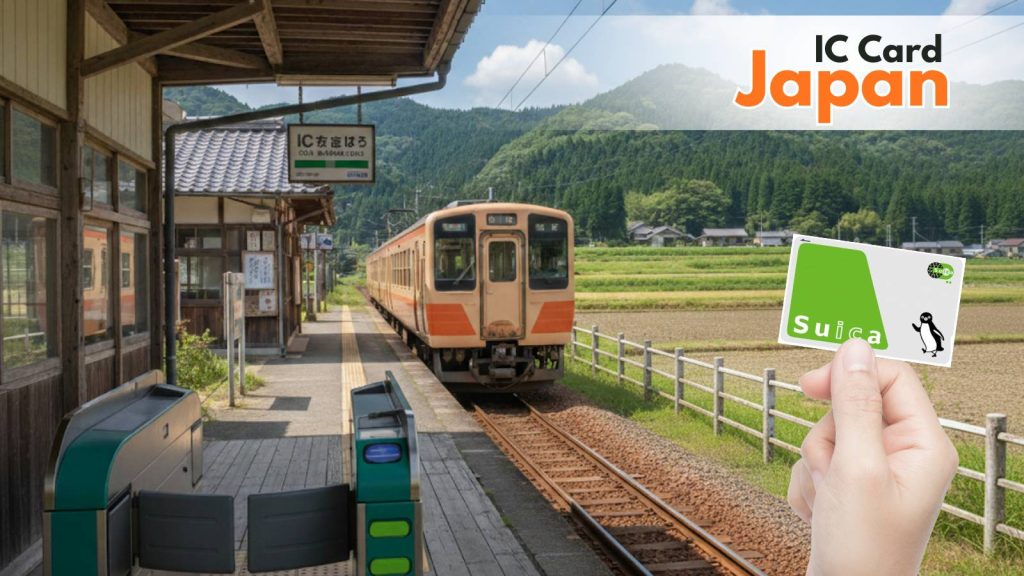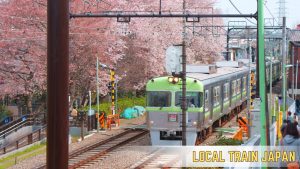Japan is renowned for its highly efficient and reliable public transportation system. Among the conveniences that travelers often overlook is the use of IC card Japan, a prepaid smart card that simplifies travel across trains, buses, and even some shops.
Using Local Trains & Ferries in Japan: Cheap Ways to See Coastal
While major cities like Tokyo and Osaka see widespread IC card usage, understanding how these cards work on private and local trains outside major cities is crucial for travelers looking to explore rural and lesser-known regions of Japan.
Understanding IC Cards in Japan
IC cards, such as Suica, Pasmo, ICOCA, and TOICA, are rechargeable contactless smart cards widely used for fare payment across trains, buses, and even select convenience stores and vending machines. Their primary advantage lies in eliminating the need to purchase individual tickets for each journey. Instead, travelers can simply tap their card at the ticket gate, making travel seamless and efficient.
How Much is a Trip to Japan? Full Cost Guide for All Plans
Beyond convenience, IC cards provide a way to save time and reduce stress. Tourists can explore new regions without worrying about exact fare costs, unfamiliar ticket machines, or complex route systems. For those venturing outside major urban centers, IC cards remain an invaluable tool, provided travelers understand regional nuances and limitations.
IC Card Compatibility with Private & Local Trains
Nationwide Mutual Usage Service
One of the most remarkable features of IC card Japan is the nationwide interoperability of cards. Most IC cards issued in Japan are part of the Nationwide Mutual Usage Service, which means a Suica card purchased in Tokyo can typically be used in Osaka, Nagoya, or other cities. This interoperability extends to many private and regional train operators, making it easier for travelers to move between cities without purchasing multiple tickets.
Top 10 Must-Visit Shrines and Temples in Japan for Culture Lovers
It is essential to verify whether the specific train line accepts IC cards. Most major private railways, including Kintetsu, Keihan, Odakyu, and Tokyu, have integrated IC card payment systems. For travelers, this means minimal hassle when traveling through suburban or rural areas served by private lines.
Regional Variations
While IC cards enjoy broad compatibility, regional variations exist. For instance, IC cards may not be accepted on extremely small local lines or buses in rural towns. Lines in regions like Tohoku or Shikoku may require cash or region-specific IC cards. Checking local railway websites or station information can help avoid inconvenience.
Using IC Cards in Rural and Lesser-Known Areas
Acceptance in Non-Major Cities
When venturing outside major metropolitan areas, it’s important to know where your IC card will be accepted. Cities like Nara, Kanazawa, Toyama, and smaller coastal towns increasingly accept IC cards on local trains. Even in these areas, some stations may have unmanned gates, and passengers can simply show their IC card to the conductor or station staff.
For travelers, IC card Japan ensures seamless travel across both urban and semi-rural areas, provided that regional compatibility is checked in advance. This allows for efficient travel planning without worrying about carrying cash for every journey.
Limitations and Exceptions
Despite their widespread acceptance, IC cards do have limitations. Certain rural train lines, especially single-track or privately owned local lines, may not accept IC cards. Similarly, buses in remote areas often operate on a cash-only system. When planning a trip to Japan’s countryside, travelers should confirm which lines accept IC cards to avoid confusion. Carrying a small amount of cash as a backup is always recommended.
Practical Tips for Travelers
Purchasing and Reloading IC Cards
Travelers can purchase IC cards at major train stations, airports, and convenience stores. Cards typically cost around 2,000 yen, including a 500 yen deposit. Reloading is simple, with top-ups available at ticket machines, convenience stores, and certain kiosks. For extended trips outside major cities, it’s wise to ensure the card has sufficient balance to cover multiple train rides in areas where cashless payment may be limited.
Using IC Cards for Non-Train Services
Beyond trains, IC card Japan is highly versatile. IC cards can be used for buses, select taxis, vending machines, and even purchases at convenience stores. This flexibility makes IC cards a one-stop solution for travel and small daily transactions, which is particularly useful when visiting rural towns where ATM availability may be limited.
Handling Lost or Damaged Cards
Losing an IC card in Japan can be inconvenient, but there are solutions. Registered cards can be blocked, and remaining balances transferred to a replacement card. Unregistered cards, while not recoverable, can still be replaced with a new card purchased at stations. Travelers are encouraged to register their cards or keep a record of the card number to facilitate recovery.
Proper understanding and usage of IC cards allow you to enjoy Japan’s scenic rail journeys without unnecessary complications, making every trip smoother, faster, and more enjoyable.
FAQs
1. What is an IC card in Japan and how does it work?
An IC card in Japan is a rechargeable smart card used for transportation and small purchases. It allows travelers to tap the card at train gates, buses, or even convenience stores, deducting fares automatically. It works using contactless technology, eliminating the need for individual tickets for each ride. Popular cards include Suica, Pasmo, ICOCA, TOICA, and more.
2. Can I use IC cards on private and local trains outside major cities?
Yes, most IC cards in Japan can be used on private and local trains thanks to nationwide interoperability. However, some rural or small private lines may not accept IC cards. It’s best to check the train line’s website or station information before traveling in remote areas.
3. Are there limitations when using IC cards in rural Japan?
Yes. Some rural train lines, local buses, and extremely small stations may not accept IC cards. In these cases, travelers need cash. Carrying a small amount of Japanese yen as a backup is always recommended when exploring non-major cities.
4. Which IC cards are best for travelers visiting Japan outside big cities?
The most commonly accepted cards include Suica, Pasmo, ICOCA, TOICA, Kitaca, manaca, and nimoca. These cards are generally compatible with most private and regional trains, making them convenient for both urban and rural travel.
5. How do I purchase and reload an IC card in Japan?
IC cards can be purchased at major train stations, airports, or convenience stores. The initial cost usually includes a 500 yen deposit. Reloading can be done at ticket machines, convenience stores, or station kiosks. Some IC cards also allow online top-ups through mobile apps.
6. Can I use IC cards for buses and other services outside major cities?
Yes, many local buses, taxis, vending machines, and shops accept IC cards. However, some remote or rural buses might still require cash. Using an IC card provides added convenience, especially in semi-urban areas where payment options are limited.
7. What should I do if my IC card is lost or damaged?
If your IC card is registered, you can block it and transfer the remaining balance to a new card. Unregistered cards cannot be recovered, but a new IC card can be purchased. It’s a good idea to register your IC card or note the card number to make recovery easier.
8. Do I need a separate IC card for each region in Japan?
No. Most IC cards are part of the Nationwide Mutual Usage Service, allowing them to work across regions. For example, a Suica card from Tokyo can be used in Osaka, Nagoya, or other areas, including many private rail lines.
9. How do IC cards make traveling outside major cities easier?
IC cards eliminate the need to calculate fares or purchase tickets for every trip. Travelers can move seamlessly between trains, buses, and other services. This is especially useful in less populated areas where station staff may be limited and ticket machines may not have English instructions.
10. Are there any extra tips for using IC cards in rural Japan?
- Always check if your destination station accepts IC cards.
- Carry small cash for backup in rural or remote areas.
- Keep your card topped up before long journeys to avoid running out of balance.
- Use IC cards not only for transport but also for small purchases like snacks, drinks, and convenience store items, enhancing travel convenience.





